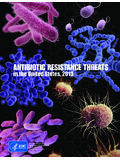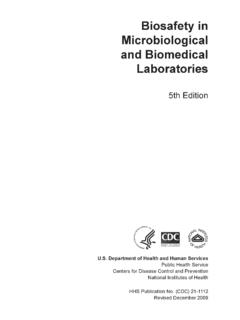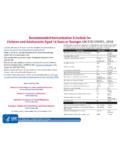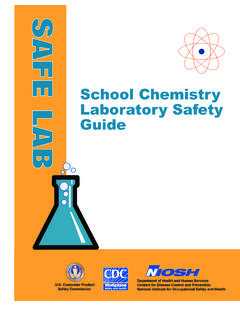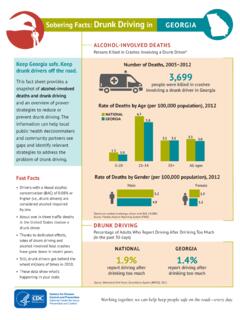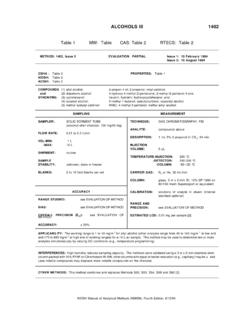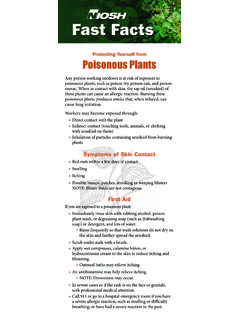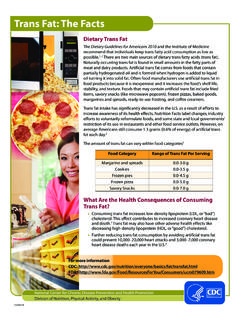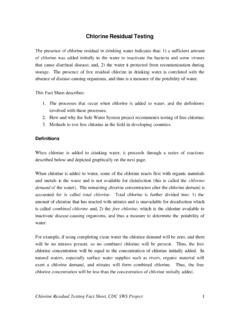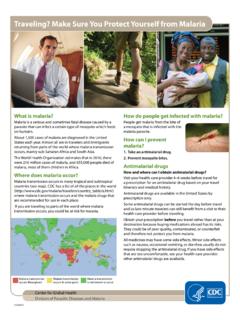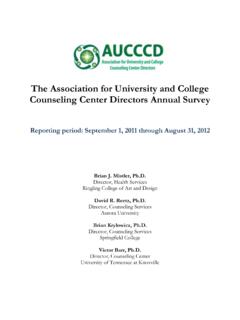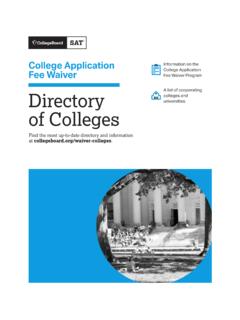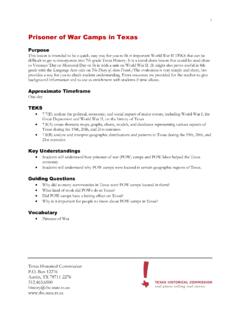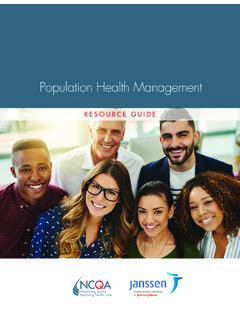Transcription of Voluntary Guidelines for Managing Food Allergies In ...
1 Managing food Allergies IN SCHOOLS Voluntary Guidelines for Managing food Allergies In Schools and Early Care and Education Programs Centers for Disease Control and PreventionNational Center for Chronic Disease Prevention and Health PromotionDivision of Population Health2 Voluntary Guidelines for Managing food Allergies In Schools and Early Care and Education ProgramsFOR FREE COPIESD ownload (232-4636); TTY: 1-888-232-6348 Suggested CitationCenters for Disease Control and Prevention. Voluntary Guidelines for Managing food Allergies in Schools and Early Care and Education Programs. Washington, DC: US Department of Health and Human Services; site addresses of nonfederal organizations are provided solely as a service to our readers. Provision of an address does not constitute an endorsement of this organization by CDC or the federal government, and none should be inferred.
2 CDC is not responsible for the content of other organizations Web of trade names and commercial sources is for identification only and does not imply endorsement by the Public Health Service or the Department of Health and Human Guidelines for Managing food Allergies In Schools and Early Care and Education ProgramsCONTENTSA cknowledgements ..7 Introduction ..9 Overview ..9 FDA food Safety Modernization Act ..10 Methods ..12 Purpose ..17 About food Allergies ..19 Section 1 . food Allergy Management in Schools and Early Care and Education Programs ..24 Essential First Steps ..241. Use a coordinated approach that is based on effective partnerships..242. Provide clear leadership to guide planning and ensure implementation of food allergy management plans and practices.
3 253. Develop and implement a comprehensive plan for Managing food Allergies ..27 Priorities for Managing food Allergies ..291. Ensure the daily management of food Allergies for individual children..292. Prepare for food allergy emergencies..343. Provide professional development on food Allergies for staff..374. Educate children and family members about food Allergies ..395. Create and maintain a healthy and safe educational environment..40 food Allergy Management and Prevention Plan Checklist ..47 Section 2 .Putting Guidelines into Practice: Actions for School Boards and District Staff ..48 School District Policy Support ..48 School District Staff Support ..48 School Board Members ..49 School District Superintendent ..51 Health Services Director ..52 Student Support Services Director.
4 55 District food Service Director ..56 Section 3 .Putting Guidelines into Practice: Actions for School Administrators and Staff ..60 School Administrator ..604 Voluntary Guidelines for Managing food Allergies In Schools and Early Care and Education ProgramsRegistered School Nurses ..63 School Doctors ..66 Health Assistants, Health Aides, or Other Unlicensed Personnel ..68 Classroom Teachers ..70 School food Service Managers and Staff ..74 School Counselors and Other Mental Health Services Staff ..77 Bus Drivers and School Transportation Staff ..79 Facilities and Maintenance Staff ..80 Section 4 .Putting Guidelines into Practice: Actions for Early Care and Education Administrators and Staff ..82 Program Directors and Family Child Care Providers ..82 Child Care Providers, Preschool Teachers, Teaching Assistants, Volunteers, Aides, and Other Staff.
5 84 Nutrition Services Staff ..87 Health Services Staff ..89 Section 5 .Federal Laws and Regulations that Govern food Allergies in Schools and Early Care and Education Programs ..91 Section 504 of the Rehabilitation Act of 1973 (Section 504) and the Americans with Disabilities Act of 1990 (ADA) ..91 Governing Statutes and Regulation for Departmentof Agriculture s (USDA) Child Nutrition Programs (CNPs) ..93 Individuals with Disabilities Education Act (IDEA) ..94 Family Educational Rights and Privacy Act (FERPA) of 1974 ..95 Section 6 . food Allergy Resources ..97 Glossary of Abbreviations and Acronyms ..104 References ..1055 Voluntary Guidelines for Managing food Allergies In Schools and Early Care and Education Programs Voluntary Guidelines for Managing food Allergies In Schools and Early Care and Education Programs7 Voluntary Guidelines for Managing food Allergies In Schools and Early Care and Education ProgramsACKNOWLEDGEMENTST hese Guidelines were prepared by the Centers for Disease Control and Prevention s (CDC s) National Center for Chronic Disease Prevention and Health Promotion, Division of Population Health, with conceptual, technical, and editorial help from other federal agencies, including the Department of Education, Department of Agriculture, and Department of Justice.
6 Other operating divisions of the Department of Health and Human Services (HHS), including the Administration for Children and Families (ACF), food and Drug Administration (FDA), and National Institutes of Health (NIH). CDC acknowledges Mr. Pete Hunt (HHS/CDC) for his role as lead author of these Guidelines . CDC also acknowledges Dr. Katherine Beckmann (HHS/ACF), Dr. Stefano Luccioli (HHS/FDA), Dr. Scott Sicherer (Mount Sinai School of Medicine), Ms. Marlie Doucet (Research Fellow, Oak Ridge Institute for Science), and Dr. Lani Wheeler (contractor, DANYA, Inc.) for their significant Guidelines are based on expert panel guidance received in 2010 and subsequent review and comment provided by the following experts (2010 panelists identified by *):* Kelly Beckwith (MPH) Project Director American Association of School Administrators* Martha Bergren (DNS, RN, NCSN, FNASN, FASHA) Director of Research (Former) National Association of School Nurses * Julia Bradsher (PhD, MBA) Chief Executive Officer (Former) food Allergy & Anaphylaxis Network* Mary Brasler (EdD, MSN) Director of Programs Asthma and Allergy Foundation of America * Elizabeth Bugden (MS) food Scientist Bugden Solutions Manchester, NH Ralph Cash (PhD) Assoc.
7 Professor of School Psychology Nova Southeastern University Ft. Lauderdale, FL President (Former) National Association of School Psychologists* Margaret Cheeley (EDS, NCC/NCSC, LPC) Professional Counselor Collins Hill High School Lawrenceville, GA Representing: American School Counselor Association* Peggy Eller Nutrition Services Director Hudson School District Hudson, WI Representing: School Nutrition Association* Amy Garcia (RN, MSN) Executive Director (Former) National Association of School Nurses * Eleanor Garrow VP of Education and Outreach (Former) food Allergy Research & Education* Brenda Z . Greene (MFA) Director of School Health Programs (Retired 2011) National School Boards Association* Nora Howley (MA) Manager of Programs National Education Association Health Information Network8 Voluntary Guidelines for Managing food Allergies In Schools and Early Care and Education Programs Raymond Lechner (PhD) Superintendent Wilmette Public Schools, District 39 Wilmette, IL Harvey L.
8 Leo (MD) Assistant Research Scientist Center for Managing Chronic Disease University of Michigan School of Public Health Ann Arbor, MI* Mary Jane Marchisotto (MBA) Senior Vice President of Research and Operations food Allergy Research & Education* Amanda K . Martinez (MPH, MSN, RN) Project Associate National School Boards Association * Jane McLucas (SNS) Director of Nutrition Norwood Public Schools Norwood, MA* Jill Mindlin (JD) Support Group Leaders Executive Council food Allergy Research & Education Anne Mu oz-Furlong Founder & CEO (Former) food Allergy & Anaphylaxis Network Michael Pistiner (MD, MMSc) Pediatric Allergist Harvard Vanguard Medical Associates Boston, MA Instructor of Pediatrics Children s Hospital & Harvard Medical School Boston, MA* Eddie Pollard (MEd, EDS) Principal Tyrone Elementary School Tyrone, GA Representing.
9 National Association of Elementary School Principals Sally Schoessler (MEd, BSN, RN) Director of Nursing Education National Association of School Nurses Anne Sheetz (MPH, RN NEA-BC) Director of School Health Services Massachusetts Department of Public Health Representing: American School Health Association* Scott Sicherer (MD) Professor of Pediatrics Mount Sinai School of Medicine New York, NY Representing: American Academy of Pediatrics* Barry Stark (MS, EDS) Principal UNL Independent Study High School Lincoln, NE Representing: National Association of Secondary School Principals Dana V . Wallace (MD, FACAAI, FAAAAI) Associate Clinical Professor Nova Southeastern University Fort Lauderdale, FL President (Former) American College of Asthma, Allergy, and Immunology* Christopher Weiss (PhD) Vice President of Advocacy and Government Relations (Former) food Allergy & Anaphylaxis Network* Lani Wheeler (MD, FAAP, FASHA) Pediatric and School Health Consultant Naples, FL Representing.
10 American School Health Association and American Academy of Pediatrics* Susan Wooley (PhD, MCHES) Executive Director (Former) American School Health Association9 Voluntary Guidelines for Managing food Allergies In Schools and Early Care and Education ProgramsINTRODUCTIONO verviewFood Allergies are a growing food safety and public health concern that affect an estimated 4% 6% of children in the United ,2 Children with food Allergies are two to four times more likely to have asthma or other allergic conditions than those without food The prevalence of food Allergies among children increased 18% during 1997 2007, and allergic reactions to foods have become the most common cause of anaphylaxis in community health ,3 In 2006, about 88% of schools had one or more students with a food Staff who work in schools and early care and education (ECE)
